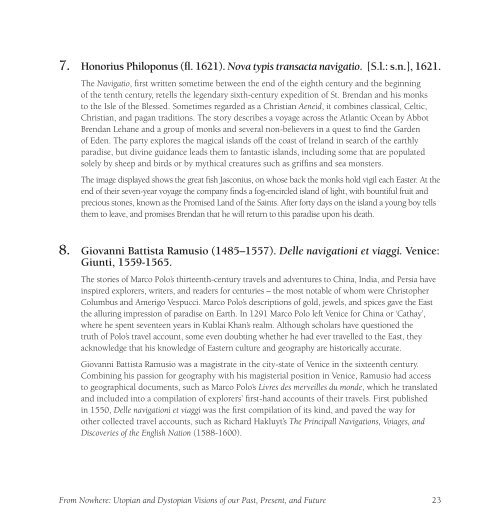From Nowhere: Utopian and Dystopian Visions of our - Chris J. Young
From Nowhere: Utopian and Dystopian Visions of our - Chris J. Young
From Nowhere: Utopian and Dystopian Visions of our - Chris J. Young
You also want an ePaper? Increase the reach of your titles
YUMPU automatically turns print PDFs into web optimized ePapers that Google loves.
7. Honorius Philoponus (fl. 1621). Nova typis transacta navigatio. [S.l.: s.n.], 1621.<br />
The Navigatio, first written sometime between the end <strong>of</strong> the eighth century <strong>and</strong> the beginning<br />
<strong>of</strong> the tenth century, retells the legendary sixth-century expedition <strong>of</strong> St. Brendan <strong>and</strong> his monks<br />
to the isle <strong>of</strong> the Blessed. Sometimes regarded as a <strong>Chris</strong>tian Aeneid, it combines classical, Celtic,<br />
<strong>Chris</strong>tian, <strong>and</strong> pagan traditions. The story describes a voyage across the Atlantic Ocean by Abbot<br />
Brendan Lehane <strong>and</strong> a group <strong>of</strong> monks <strong>and</strong> several non-believers in a quest to find the Garden<br />
<strong>of</strong> Eden. The party explores the magical isl<strong>and</strong>s <strong>of</strong>f the coast <strong>of</strong> irel<strong>and</strong> in search <strong>of</strong> the earthly<br />
paradise, but divine guidance leads them to fantastic isl<strong>and</strong>s, including some that are populated<br />
solely by sheep <strong>and</strong> birds or by mythical creatures such as griffins <strong>and</strong> sea monsters.<br />
The image displayed shows the great fish Jasconius, on whose back the monks hold vigil each Easter. At the<br />
end <strong>of</strong> their seven-year voyage the company finds a fog-encircled isl<strong>and</strong> <strong>of</strong> light, with bountiful fruit <strong>and</strong><br />
precious stones, known as the Promised L<strong>and</strong> <strong>of</strong> the Saints. After forty days on the isl<strong>and</strong> a young boy tells<br />
them to leave, <strong>and</strong> promises Brendan that he will return to this paradise upon his death.<br />
8. Giovanni Battista Ramusio (1485–1557). Delle navigationi et viaggi. Venice:<br />
Giunti, 1559-1565.<br />
The stories <strong>of</strong> Marco Polo’s thirteenth-century travels <strong>and</strong> adventures to China, india, <strong>and</strong> Persia have<br />
inspired explorers, writers, <strong>and</strong> readers for centuries – the most notable <strong>of</strong> whom were <strong>Chris</strong>topher<br />
Columbus <strong>and</strong> Amerigo Vespucci. Marco Polo’s descriptions <strong>of</strong> gold, jewels, <strong>and</strong> spices gave the East<br />
the alluring impression <strong>of</strong> paradise on Earth. in 1291 Marco Polo left Venice for China or ‘Cathay’,<br />
where he spent seventeen years in Kublai Khan’s realm. Although scholars have questioned the<br />
truth <strong>of</strong> Polo’s travel account, some even doubting whether he had ever travelled to the East, they<br />
acknowledge that his knowledge <strong>of</strong> Eastern culture <strong>and</strong> geography are historically accurate.<br />
Giovanni Battista Ramusio was a magistrate in the city-state <strong>of</strong> Venice in the sixteenth century.<br />
Combining his passion for geography with his magisterial position in Venice, Ramusio had access<br />
to geographical documents, such as Marco Polo’s Livres des merveilles du monde, which he translated<br />
<strong>and</strong> included into a compilation <strong>of</strong> explorers’ first-h<strong>and</strong> accounts <strong>of</strong> their travels. First published<br />
in 1550, Delle navigationi et viaggi was the first compilation <strong>of</strong> its kind, <strong>and</strong> paved the way for<br />
other collected travel accounts, such as Richard Hakluyt’s The Principall Navigations, Voiages, <strong>and</strong><br />
Discoveries <strong>of</strong> the English Nation (1588-1600).<br />
<strong>From</strong> <strong>Nowhere</strong>: <strong>Utopian</strong> <strong>and</strong> <strong>Dystopian</strong> <strong>Visions</strong> <strong>of</strong> <strong>our</strong> Past, Present, <strong>and</strong> Future 23


